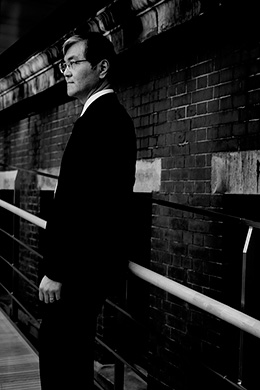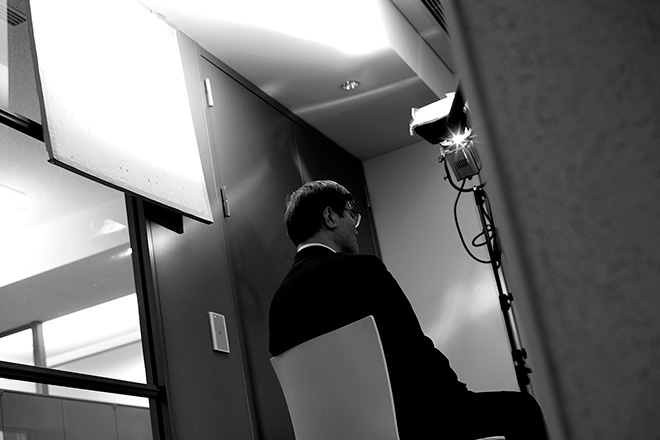Medical Technology and Healthcare Policy
Ichiro Sakuma / The University of Tokyo, School of Engineering

Q: I think the term “biomedical precision engineering” is certainly not familiar to a typical person. What specifically is it that you study?
Sakuma: As far as terminology is concerned, I believe “medical engineering” is more appropriate. What precision engineering entails, however, is a scholastic field that strives to create some form of functionality, and this was part of the original intent behind the discipline. Thus, some of the activities we engage in come under the areas formerly known as productive technologies and productive systems. Moreover, we obtained tools of extremely high reliability and extremely high precision that have been developed elsewhere and understand how they can be applied to medical use.
If we are talking about the original medical applications of engineering, I believe electrical technologies such as the electrocardiogram came first, and then technologies of a more mechanical and componential nature, and I believe that the research of this field is now focusing on bringing these various technologies together into integrated systems.
Q: What is it that you are focusing on in particular in your research, and what is the source of your motivation for being in medical engineering for so long?
Sakuma: One of the reasons I opted for biomedical engineering is that I believed it was a form of science that could contribute for the development of fundamental aspects of human life.
Beyond that, there is something I learned from my senior colleagues that I believe can be said of engineering in general: when I was considering the question of exactly what science and engineering is, I recall being informed that in medical engineering, if you discover a single, new technology that enables you to, for example, cure a single instance of some disease, you cannot let yourself be satisfied with that result. We know that, in engineering technology, it is not making a discovery based on a single result, but making that result universal and standardized that matters. This is something that I was informed, which has remained with me.
I would very much like to develop such a technology. To give a specific example, Japanese researchers, including myself, are now putting diagnostic instruments out into the world. These are instruments with relatively complex systems such as surgical robots and therapeutic devices.
In that respect, the basic research level of Japan is actually very high, and what I would like to do is take that skill and bring it into a solid system to form academy–industry alliances and to send the fruits of these labors out into the world.

Q:Could you tell us something about regulatory science?
Sakuma: In a certain sense, when the latest scientific results are presented to society, part of the communication process that occurs involves risk management, by way of which the actual technology or techniques are embedded into society, so to speak. I think regulatory science is a science for that purpose.
If we are talking about medical equipment, for example, one aspect of the conversation is safety. Another aspect would be the need to demonstrate effectiveness, since there is no reason in making equipment that is of no use.
However, when attempting to persuade society regarding something completely unknown, it is not enough to simply say that one believes in it. There must be some type of scientific method present, and from that there must be predictions that can be made through newer scientific knowledge. I believe the act of showing those predictions is what constitutes regulatory science.
Thus, in reality, and again, particularly in the case of medical devices, if you are attempting to use some extremely high-risk medical equipment, then, in a certain sense, inherent in that usage is the potential for unfortunate results.
The conversation then becomes one of minimizing those unfortunate results; thus, I believe that the objective assessment and risk disclosure fundamentally become to a certain extent an important factor in informed consent.
There will be some scientific technique, some knowledge of what is appropriate, various statistics, or there may be some extrapolations based on physical theories, or perhaps animal testing, or other things that make use of such experimentation or limited clinical research. Therefore, I believe regulatory science is the attempt to combine methodologies such as these in a proper manner.

Q:What type of students would you like to see participating in this training program?
Sakuma: Well, since I am an engineer, I would like to see students who have an interest in technology, and also students who dream of making the impossible possible.
However, I realize that dreams alone will not get you anywhere; thus, I would also like to see students who are interested in bringing their dreams to life in the real world.
Moreover, what you often see is, well, to take an example, I believe that mere consulting roles are not useful when we talk about the way in which a technology is applied to society.
I would like to see members of the program become people who have a basis in deep specializations and who debate topics. I would like to see them become people who are able to persuade as well as cooperate with those who are in position to implement those new technologies widely in the society. Thus, I would also like to see students interested in these types of things.
In a certain way, hmmm, I wonder how best to say this. In a broad sense, I suppose I would like to see students who are highly ethical—who have that type of vision. I would love to see people like that come to the program.
